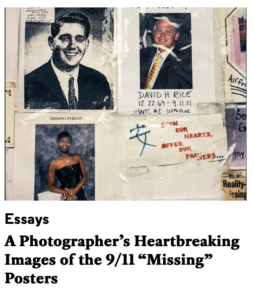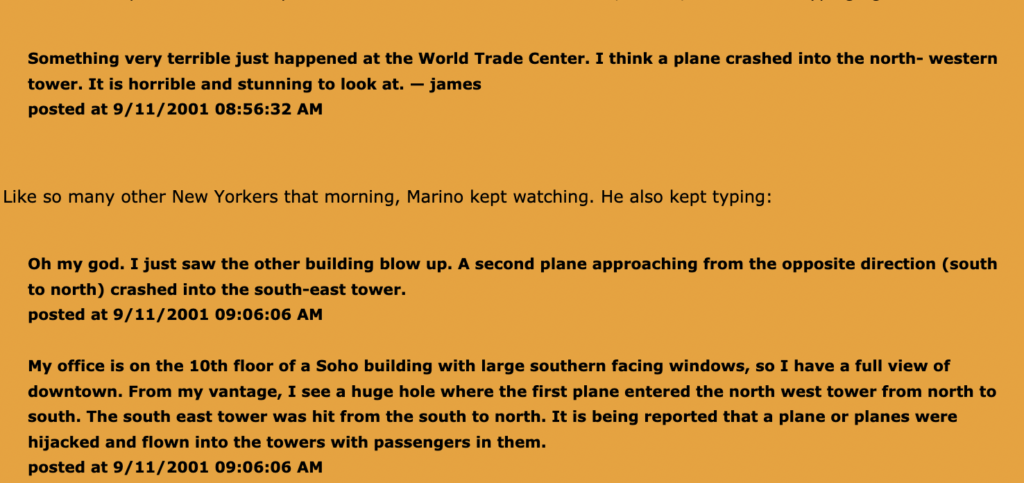Memories of 9/11
Amid the torrent of stuff triggered by the 20th anniversary of the attach, some things stood out, One was this Aperture essay by Lynne Gilman.
In the weeks after 9/11, Steve Pyke photographed posters of the missing from the Twin Towers. Published for the first time twenty years later, they remain instant memorials to an incalculable loss…
And then this Diary piece by Sukhdev Sandhu in the London Review of Books published on 4 October 2001. It may be back behind the paywall by the time you read this, but here’s how it opens…
At first I’m sure it’s going to be a great day. Sun out. Bright blue skies. The end of summer. Even the sirens and engines that have been wailing outside my apartment window for the last hour don’t seem that unusual. Just, I assume, part of the hysteric clangour taken for granted by those who live in Manhattan. Only when I step out onto First Avenue to head downtown do things begin to seem strange. Hundreds of people are heading in my direction. Some are running. Mums are clutching young kids and looking over their shoulders fearfully. No cars or cabs, but police are everywhere. In the distance I see a huge black blob disfiguring the sky. Maybe a thunderstorm’s brewing? I step in front of a fleeing office worker: ‘Excuse me, but has something happened?’ His answer comes out as barely comprehensible comic-book babble: ‘The World Trade Center has been hit – it was a plane – enemies – terrorists – hijackers – the Pentagon too – the White House – Pittsburgh.’
By the time I reach my department at NYU everyone is ripped with panic. There was a bomb threat earlier and security has only just left. Phones ring non-stop but go dead as soon as they’re picked up. E-mail is down. The BBC and CNN websites are overloaded. A few people huddle round a radio trying to get more news. Each time Pearl Harbor is mentioned they turn their backs in fear: here at the Asian American Studies program where I teach, everyone is acutely aware that the 1941 bombings led to tens of thousands of Japanese Americans being scapegoated and interned. We yell out the names of people we knew who work at the Twin Towers and rummage around in drawers and diaries looking for their cellphone numbers, which we dial frantically, and often in vain. Do any of our students live near the financial district? Where can we go to give blood? Somebody mentions the date – 911; someone else Nostradamus. But, for once, no one has the heart or the detachment to think up sick jokes. Support staff want to go home. Many have a long journey ahead, commuting back to Jersey and Queens and Brooklyn. They’re scared that they might be trapped in Manhattan, cut off from their families. ‘My mom and me, we ain’t too close,’ says one secretary, ‘but …’
Then there’s this from the Introduction to Scott Rosenberg’s lovely 2010 book on blogging.
On the morning of September 11, 2001, James Marino sat at his desk at 568 Broadway, looking out a tall window that revealed a panorama of the lower Manhattan skyline. He’d come to the office early to work on his side business — a website called Broadwaystars.com. The site collected tidbits of news and gossip about the New York theater scene and served them up blog-style, time-stamped, with new items at the top. At 8:49 a.m. he’d posted a passel of links: an AIDS benefit recap. Declining box office numbers from Variety. The impending release of a cast album for a show by Rent’s Jonathan Larson titled tick, tick . . . BOOM!
Marino clicked post and looked up from his monitor. He froze a moment, stared, then started typing again:
Finally, here is the first of Jeff Jarvis’s unparalleled audio recollections of his experiences that day.
There are five more. Each one unforgettable.
Quote of the Day
”Most rock journalism is people who can’t write interviewing people who can’t talk for people who can’t read.”
- Frank Zappa
Musical alternative to the morning’s radio news
Samuel Barber | Agnus Dei | Laurens Symfonisch
Came to mind thinking about 9/11 over the weekend.
Long Read of the Day
When every car is electric, what happens to fuel duty and the electricity grid?
A terrific piece by Charles Arthur on what few people talk or think about: what happens when the UK government’s stated policy of banning the sale of new petrol or diesel cars by 2030 comes into force? This policy will cause immense upheaval in UK tax revenues and in the infrastructure for electricity generation and supply. For starters: it means billions and billions in in lost tax revenues, and a requirement of up to 20% more electricity generation.
The switch to EVs is a good idea, but — as Charles points out — it has major implications.
Read on to see what they are…
What’s the next big technological epoch?
My column in yesterday’s Observer:
One of the challenges of writing about technology is how to escape from what the sociologist Michael Mann memorably called “the sociology of the last five minutes”. This is especially difficult when covering the digital tech industry because one is continually deluged with ‘new’ stuff – viral memes, shiny new products or services, Facebook scandals (a weekly staple), security breaches etc. Recent weeks, for example, have brought the industry’s enthusiasm for the idea of a “metaverse” (neatly dissected here by Alex Hern), El Salvador’s flirtation with bitcoin, endless stories about central banks and governments beginning to worry about regulating cryptocurrencies, Apple’s possible rethink of its plans to scan phones and iCloud accounts for child abuse images, umpteen ransomware attacks, antitrust suits against app stores, the Theranos trial and so on, apparently ad infinitum.
So how to break out of the fruitless syndrome identified by Prof Mann? One way is to borrow an idea from Ben Thompson, a veteran tech commentator who doesn’t suffer from it, and whose (paid) newsletter should be a mandatory daily email for any serious observer of the tech industry. Way back in 2014, he suggested that we think of the industry in terms of “epochs” – important periods or eras in the history of a field. At that point he saw three epochs in the evolution of our networked world, each defined in terms of its core technology and its “killer app”.
Epoch one in this framework was the PC era, opened in August 1981 when IBM launched its personal computer…
How Mushroom Time Lapses Are Filmed
This is utterly riveting — at least if you’re a photographer, or a fan of nature film-making.
H/T to Jason Kottke.
This blog is also available as a daily newsletter. If you think this might suit you better why not sign up? One email a day, Monday through Friday, delivered to your inbox at 7am UK time. It’s free, and there’s a one-button unsubscribe if you conclude that your inbox is full enough already!


